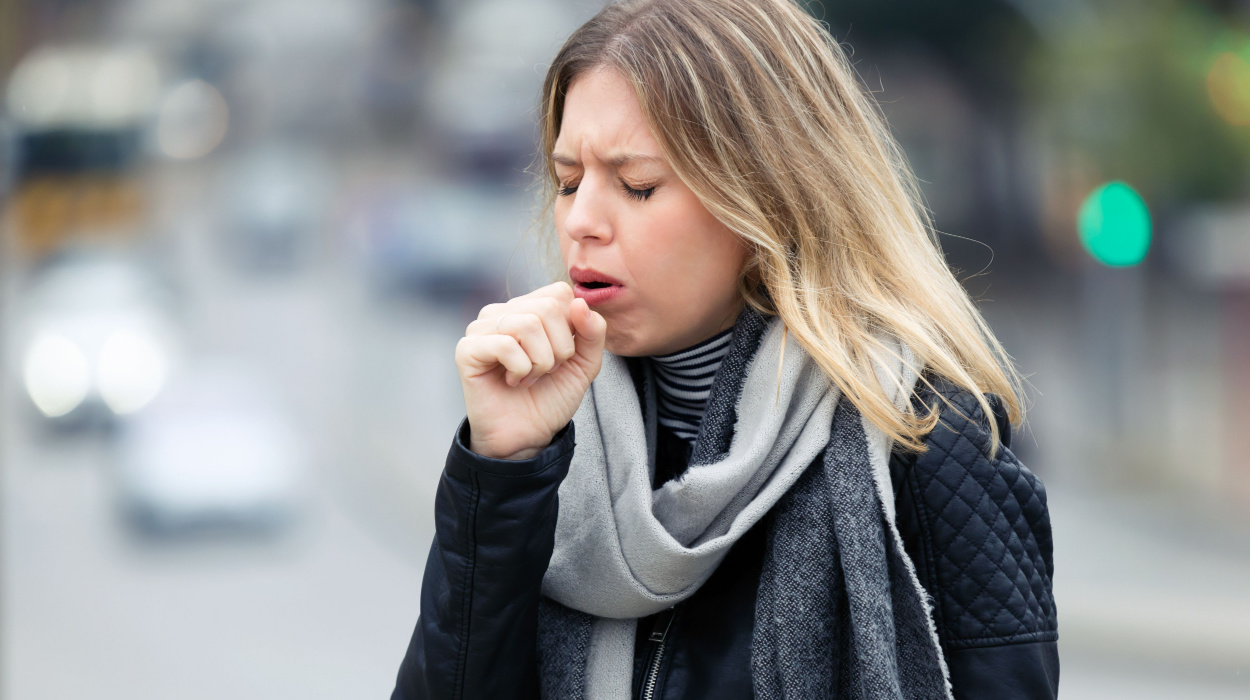Coughing can be annoying and sometimes even painful. There are times when cough medicines are necessary depending on the type of cough you are experiencing, but other times you can use natural cough remedies and avoid the cough drops! Let’s begin with how to soothe a cough, and the types of different coughs, then move on to common causes of coughs.
How To Soothe A Cough?
- Soothe With Honey
- Gargle With Saltwater
- Turn On A Humidifier
- Steam Inhalation
How To Soothe A Cough?
If you want to treat coughs naturally or get symptom relief then you can try one of these home remedies.
Soothe With Honey
Honey has been used for centuries as a natural remedy for a variety of ailments or a cough suppressant, like a cough. The antibacterial and anti-inflammatory properties of honey can help soothe the irritated throat, thin thick mucus, and reduce inflammation, making it an effective natural remedy for a cough.
There are several ways to use honey to soothe a cough. One of the most popular methods is to mix a tablespoon of honey with a glass of warm water and lemon juice and drink it before bedtime. This mixture can help coat the throat and reduce inflammation, making it easier to sleep. Another way is to add a spoonful of honey to herbal teas such as ginger, lemon, or thyme, which can help soothe the throat and reduce coughing.
These homemade cough suppressants can also be used as a natural sweetener in place of sugar, which can aggravate a cough. For children, a small amount of honey can be added to a warm drink before bedtime as an alternative to over-the-counter cough syrups. This is important to note that honey should not be given to children younger than 1 year old, as it can contain a type of bacteria that can be harmful to infants.
It’s also worth mentioning that most of the studies have been conducted on specific types of honey such as Manuka honey, which is known for its antibacterial properties. It’s not clear whether other types of honey have the same effect.
Gargle With Saltwater
Gargling salt water can help with a cough by reducing inflammation and irritation in the throat. Salt water can help to break up mucus and phlegm, making it easier to cough up. The warm water also helps to soothe soreness in the throat. To use this remedy, dissolve 1/2 teaspoon of salt in a glass of warm water and gargle with it for 30 seconds. Repeat this process several times a day as needed. It’s important to note that this remedy is not recommended for children under 6 years old and individuals with high blood pressure should avoid or use it with caution.
Turn On A Humidifier
Turning on a humidifier can help with a cough by adding moisture to the air. Dry air can cause irritation and dryness in the throat, which can make coughing worse. A humidifier can help to alleviate these symptoms by adding moisture to the air, which can help to soothe the throat and reduce coughing. Additionally, it can help to break up mucus and make it easier to cough up. You’ll want to clean your humidifier regularly as the moisture makes it prone to mold and fungus growth. It’s also recommended to use distilled water in the humidifier to avoid the release of minerals into the air.
Steam Inhalation
Steam inhalation can help with a cough by loosening phlegm and mucus in the throat, making it easier to cough up. The heat and moisture from the steam can help to soothe a sore throat and reduce inflammation, which can also reduce coughing.
To use this remedy, fill a bowl with hot water and add a few drops of essential oils such as eucalyptus or peppermint. Place a towel over your head and lean over the bowl, inhaling the steam for several minutes. Repeat this process as needed. It’s important to be careful not to burn yourself with hot water. Steam inhalation can be particularly helpful if you have a chesty cough as it can help to break up the mucus in the lungs. We strongly recommend that you ask your doctor for advice before beginning to use any home remedy.
Types Of Coughs

There are different types of coughs,[1] each with its characteristics. These different types of cough include:
- Acute cough: A cough that occurs suddenly and persists for less than three weeks. Acute coughs commonly arise from viral infections like the flu or cold.
- Subacute cough: These coughs impact someone between three and eight weeks. A subacute cough often stems from bronchitis or infections that are bacterial.
- Chronic cough: A long-lasting cough that is present for eight weeks or more. This type of cough is usually the result of chronic conditions such as acid reflux, asthma, or chronic obstructive pulmonary disease (COPD).
- Wet cough: Wet coughs elicit phlegm or mucus from the throat. This type of cough may come from bronchitis or an infection in the chest.
- Dry cough: Dry coughs do not create mucus or any other substance. They are often the result of a viral infection, but they can also be caused by asthma.
What Causes Coughs?
A cough is a reflex action, which is why we call it a cough reflex. It helps clear the airways of mucus, phlegm, and other irritants and can lead to a sore throat. It can be caused by a variety of factors including:
- Upper respiratory tract infections. These infections, including the common cold, can cause inflammation and swelling in the airways, leading to a productive cough (one that produces phlegm or mucus). Sometimes upper respiratory infections are accompanied by other symptoms such as a runny nose. Coughing can help loosen mucus.
- Allergies and asthma. Coughing can be a symptom of an allergic reaction, such as hay fever, or a sign of asthma, a chronic lung disease characterized by inflammation and narrowing of the airways.
- Gastroesophageal reflux disease (GERD). This condition occurs when stomach acid flows back into the esophagus, causing irritation and a chronic cough. GERD can be a cause of coughing during the day or a cause of nighttime coughing.
- Chronic obstructive pulmonary disease (COPD). COPD is a group of lung diseases that includes emphysema and chronic bronchitis. It causes difficulty breathing and a persistent cough.
- Smoking and exposure to secondhand smoke. The chemicals in tobacco smoke can irritate the airways, causing a cough.
- Exposure to environmental irritants such as pollution, dust, and chemicals. These can cause inflammation and irritation in the airways, leading to a cough.
- Certain medications such as ACE inhibitors (used to treat hypertension) can cause a persistent cough.
- Certain medical conditions such as lung cancer, heart failure, and sarcoidosis can also cause a cough.
It’s important to note that a cough can be both acute (short-term) or chronic (long-term) and can be a symptom of a more serious underlying condition. If you have a persistent or severe cough, it’s best to see a doctor for a proper diagnosis and treatment.
Tips To Prevent Coughing

Preventing a cough can be done by taking steps to avoid the underlying causes of the cough and by taking care of your overall health. Here are some ways to prevent a cough:
- Wash your hands frequently. Infections are a common cause of coughs and dirty hands are a common source of exposure to various infections. Washing your hands with soap and water, or using an alcohol-based hand sanitizer can help reduce your risk of infection.
- Avoid close contact with people who are sick. If someone in your home or workplace is sick, try to keep your distance to avoid becoming infected.
- Avoid smoking and exposure to secondhand smoke. Smoking is a major risk factor for respiratory problems, including a cough. Additionally stopping smoking can also decrease or eliminate coughing.
- Avoid exposure to environmental irritants. If you live or work in an area with high levels of pollution, dust, or chemicals, try to stay indoors as much as possible. Use air purifiers and wear a mask when going outside.
- Manage your allergies and asthma. If you have allergies or asthma, work with your doctor to develop a plan to manage your symptoms and reduce your risk of a cough.
- Stay away from beverages and food items that trigger symptoms of acid reflux. Foods and drinks that can cause acid reflux, such as spicy foods, caffeine, and alcohol, can irritate the esophagus and cause a cough.
- Stay hydrated. Drinking enough water can help keep your mucous membranes moist and reduce the risk of dryness and irritation in the airways.
- Get enough rest and exercise. Regular physical activity and enough sleep can help boost your immune system and keep your overall health in good condition, which reduces the risk of cough.
It’s important to note that some coughs may be caused by an underlying condition that requires medical treatment, in these cases following these preventive steps may not be effective and it’s best to see a doctor for a proper diagnosis and treatment.
When To See A Doctor?
It’s important to see a doctor if a cough lasts longer than a few weeks, is accompanied by other symptoms such as fever, chest pain, difficulty breathing, or if you have underlying health conditions. Additionally, if you are experiencing blood in your mucus, chronic cough, or difficulty breathing, you should seek medical attention.
If you have an underlying condition such as asthma, heart disease, or chronic obstructive pulmonary disease (COPD), be sure to contact your doctor if you experience a worsening of symptoms or increased cough severity. In short, if you’re unsure of the cause of your cough consult a healthcare professional.
Frequently Asked Questions
There are many potential causes of a cough ranging from infections to GERD to other underlying medical conditions.
Honey, steam inhalation, humidifiers and gargling salt water.
Cough and cold medicines also frequently contain decongestants. Decongestants can make blood pressure worse in two ways: Decongestants may make your blood pressure rise. Decongestants may prevent high blood pressure drugs from working properly.
There are 2 types of OTC cough medicines: antitussives and expectorants. A common antitussive is dextromethorphan (some brand names: Triaminic Cold and Cough, Robitussin Cough, Vicks 44 Cough and Cold). The only expectorant available in OTC products is guaifenesin (2 brand names: Mucinex, Robitussin Chest Congestion).
Acute cough, subacute cough, chronic cough, wet cough and dry cough.
 Expert's opinion
Expert's opinion
